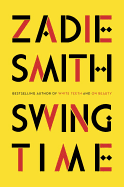
It's the rare novelist who can build a world so convincing that it's difficult to leave and reenter reality after having become so thoroughly enmeshed. They're the writers who win Nobel prizes and are still anthologized years after their deaths. They woo jaded critics and laypeople alike. They're writers like Zadie Smith, author of NW, White Teeth and most recently Swing Time.
Named for the 1936 musical starring Fred Astaire (who dons blackface during one pivotal scene), the novel centers on the mostly uneasy relationship between Tracey, a talented dancer, and her friend, the narrator, both of whom persevere with varying levels of success against the tide of their low-income London neighborhood. The novel's dealings with race are as subtle and artful as its prose; the reader witnesses both girls' attempts at forging identities amidst a variety of insults and snubs, absent fathers and well-intentioned mothers, yet Smith never wields these themes bluntly. The novel's most artful component is her ability to insinuate all manner of existential questions without verging on the moralistic or all knowing. As these women persist, their paths forking, the reader too feels fractured by the many ways reality can fulfill or defer a dream.
Spanning decades, musical genres, dance styles, continents and myriad personas, Swing Time is an ambitious, all-encompassing novel that devours its audience, swallowing all other truths in its perfectly constructed reality. Let the kettle sing, let the phone rattle; the novel's sharply rendered characters and forward-charging plot are as elegant and human as a dance. --Linnie Greene, freelance writer

